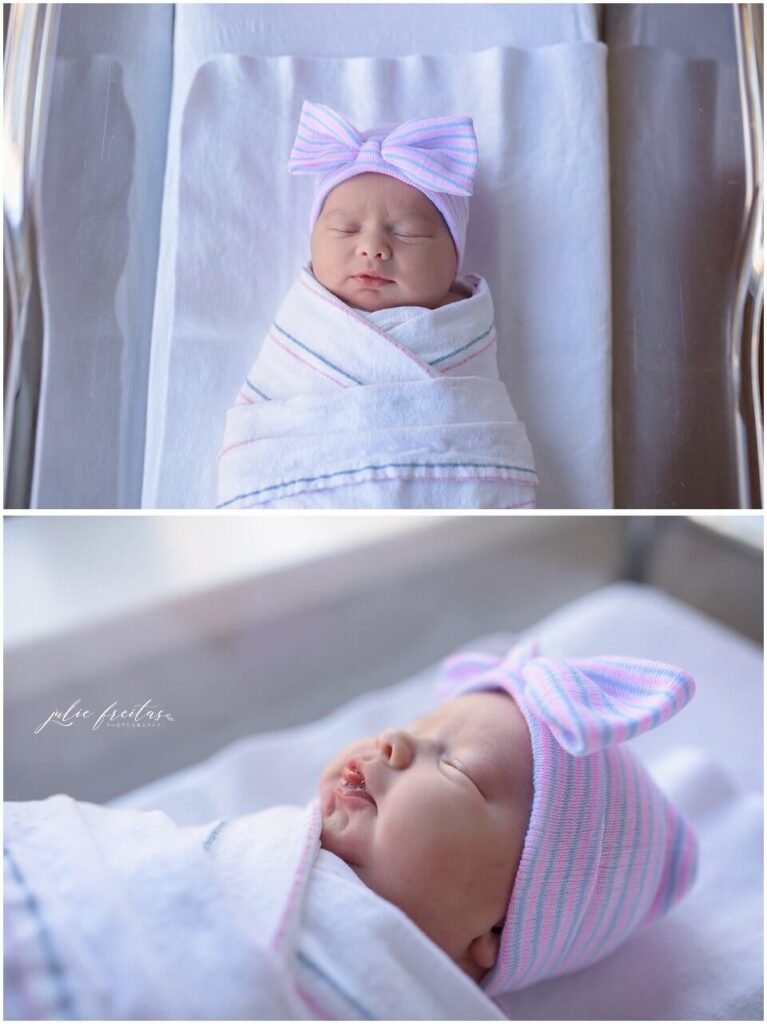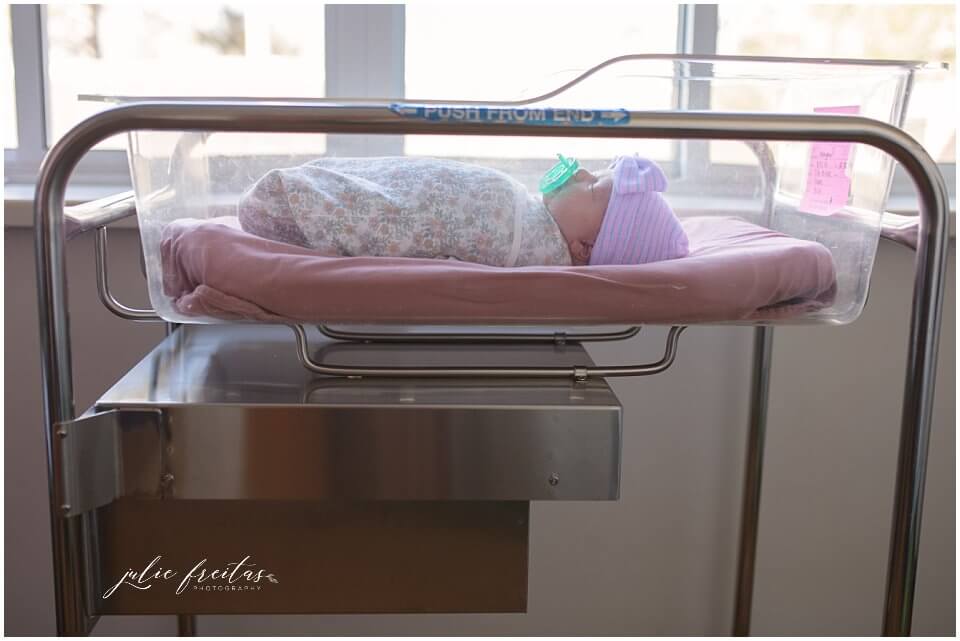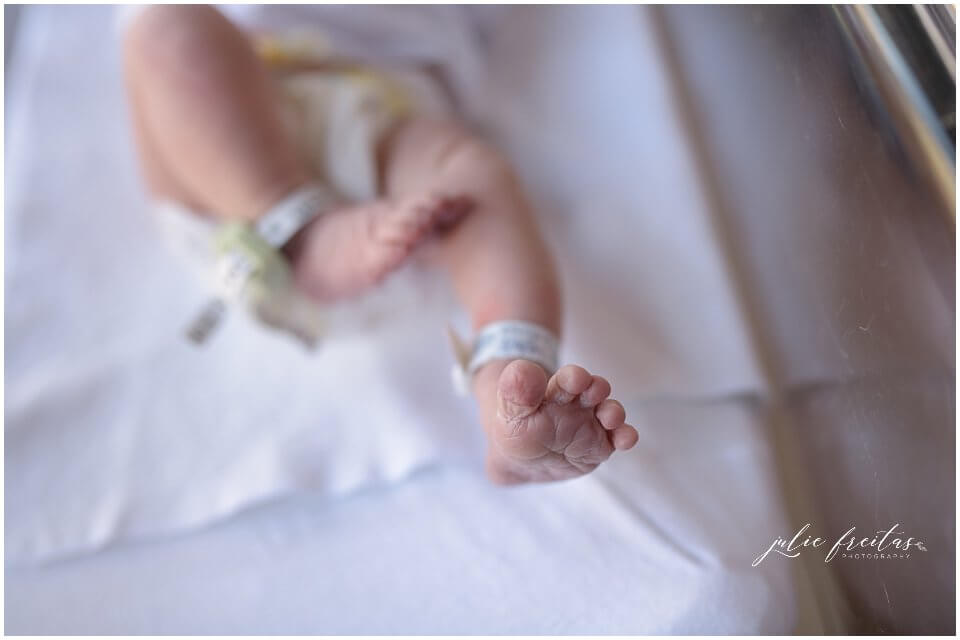The first few days after giving birth can feel like a whirlwind. Between the excitement of welcoming your baby and the challenges of adjusting to postpartum life, it’s easy to feel overwhelmed. If you’re delivering at a Boston-area hospital, knowing what to expect in the hospital after giving birth can help you feel more prepared and confident. As both a postpartum nurse and newborn photographer, I’ve helped many new moms through these early days, and I want to share some of the most important things you can expect during your hospital stay.

Frequent Frequent Check-Ins: What to Expect From Nurses and Healthcare Providers-ins
During your hospital stay, nurses will be checking in on you and your baby quite frequently. Most hospitals operate on a 12 hour shift schedule, and at the start of each shift (typically 7am and 7pm), a new nurse will be assigned to take care of you. They’ll need to check on both you and baby, including vital signs and a physical assessment. More frequent checks are typically done in the first 12-24 hours after birth, so expect your nurse to be entering your room often. You can also expect check-ins from your OB provider and your baby’s pediatrician at least once a day during your hospital stay. All of this activity can feel a bit overkill at times, but it’s all for a good reason! When you do get those quiet, uninterrupted moments, use that time to rest and bond with your baby.
Pro-tip: As a first-time mom, consider limiting visitors during the first 24 hours after birth. This is when your doctors and nurses will be checking in on you frequently, and having extra people around can add to the overwhelm. Taking this time to rest and bond with your baby without distractions can help you feel more settled and focused during those crucial first hours.
Rooming In: Bonding With Your Baby in the Hospital
At most Boston hospitals, “rooming-in,” or having your baby stay in your room with you 24 hours a day, is strongly encouraged. It helps you learn your baby’s cues and facilitates bonding. There may be times, however, when you feel too tired or overwhelmed and need a little extra help caring for your baby. In these instances, check with your nurse to see if your baby can spend an hour or two in nursery. If you are breastfeeding, you can request that your baby be brought back to you at the first signs of hunger so that they don’t go too long between feedings. Sometimes that hour or two of un-interrupted sleep is a game changer – don’t be afraid to ask for help if you need a little break!

Postpartum Care: Taking Care of Your Body After Birth
Whether you have a vaginal delivery or a c-section, bathroom trips during your first few days postpartum will look a little different. Your hospital should provide you with all of the supplies you need for perineal care – underwear, pads, a peri bottle, witch hazel, and a numbing spray. In the first 24 hours after a vaginal delivery, ice packs can be a huge help to ease pain and swelling. Ask for these if your hospital provides them. If you have a catheter, expect it to stay in for at least 12-24 hours post delivery (this is most common after a c-section delivery). Ask for stool softeners as soon as you’re able to take them – this will help ease the discomfort of the dreaded first bowel movement.
Some of my patients found it helpful to have their own supplies from home to help with comfort. The “all-in-one” panties with the built in pad, like these from Always, are a great alternative if you don’t want to deal with the mesh underwear and bulky pads.
Managing Information Overload During Your Hospital Stay
It’s common to feel overwhelmed by the amount of information coming at you during the first 24-48 hours after birth. Ask your nurse to go over key points if something isn’t clear, and don’t hesitate to request additional clarification. This is a big life event, and it’s important you feel confident in what you’re learning. If you’re sleep deprived from a long labor & delivery process, all this info may go in one ear and out the other! Don’t be afraid to ask the same question more than once. Your nurses are there to help you through this process. Writing questions down or adding them to the Notes app in your phone is a good way to keep track of things you need to have answered before you leave.
Your hospital should also send you home with discharge paperwork that goes over all of the most important information that you’ll need when heading home. These include things like when to call your healthcare provider or your baby’s pediatrician. You may find it useful to bring a folder with you to organize all of the paperwork you’ll receive while in the hospital. A helpful tip if you are feeling overwhelmed is to designate all of the paperwork organization to your support person. Let them worry about keeping things organized while you focus on rest and your baby!

Newborn Testing: What Screenings Are Done Before You Leave the Hospital
Before you leave the hospital with your baby, they’ll need to have a few screenings done as part of their routine assessment. These include a hearing test, a bilirubin screen to look for jaundice, and a blood test used to check for certain metabolic and genetic disorders (this testing varies by state). If your baby is born below a certain weight threshold, or born before 37 weeks gestation, they may also need to complete a car seat test. Make sure the car seat you plan to use to bring your baby home is readily accessible, including the base you installed in your car. Your baby may need to leave your room for these tests, or your nurse can do them right at the bedside – each hospital’s procedures will vary, so make sure to ask when and how these tests are completed before discharge.
I hope you found this list helpful for knowing a bit of what to expect when you deliver your baby in a Boston hospital. Of course, each mom’s delivery experience will vary, but the most important thing is that both mom and baby are happy and healthy!
Great Advice love the photos as well!